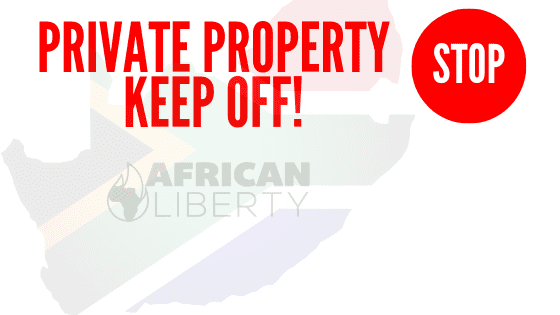Speaking at the Goldman Sachs investor conference on Wednesday, President Ramaphosa attempted to address investors’ concerns regarding expropriation of property without compensation (EWC). He has repeatedly said that EWC will happen, while also trying to reassure both South Africans and foreign investors that their investments and property will be safe. This is a contradiction in terms.
You cannot tell people that their property will be secure but also push for an amendment to the Constitution that will allow for the expropriation of that property without compensation. As much as you try to play games with words and concepts, the logic does not line up. You cannot make people believe that A is A on the one hand, and also that A is B. It would be irrational for any investor, local or foreign, to focus on empty political assurances only and not consider the implications of the parliamentary vote to amend section 25. SA desperately needs investment, to aid in driving real economic growth, and one has to wonder how much potential investment is waiting in the wings with bated breath, waiting to see what happens.
The land question may be difficult and complex in a few respects, but property rights are not: We either have individual property rights, or we do not. It is a philosophical impossibility to adopt a concept, with all its implications, and then to not adopt and accept that same concept in practice. Amending section 25 of the Constitution grants the state the privilege and status to own all property in the country, no matter which party happens to be in power at the time. It is a grave mistake to assume that when the state seizes property from someone, and then gives that property to someone else, that the recipient will be an owner in any real sense of the word.
Security of tenure extends to the property you acquire, and the wealth you accumulate. When that security is under threat from the state, no one can harbor real, long-term confidence to build a life for themselves and their families in the country concerned. There is no point in working to improve your situation in life when everything you own can be taken away overnight. And while some may think that only large farms under the ownership of white farmers will be seized, amending section 25 will mean that all property belonging to anyone will be up for grabs—no matter the color of your skin. The potential for abuse by the state is too massive to contemplate. Historical examples abound to show the abuse states inflict on people once property rights are removed. But, even more than the historical precedent against such a move, this is a moral matter—individual property rights underpin all human rights and without this base, all others become diluted as a result.
Instead of taking away property rights, the South African government could transform land ownership in a positive manner by giving people title deeds to the homes they’ve lived in for decades. The state owning our property is not transformation—people owning their own property is transformation; this allows them to either invest in it, use it as collateral to begin a business, or sell it and use the funds they receive to move to a different, more economically active area. Whatever the final decision, the most crucial point is that the power must remain in the individual’s hands—the state must not be given the power to decide for people what they should do with their property, where they should live, and whether they should own property or not. Furthermore, the state owns vast tracts of land which are unused at present—these can be unlocked and used by private individuals productively.
The land reform matter is tied to either a win-win or a lose-lose solution; on the win-win side, protect property rights, grant title deeds, and free up unused state land. On the lose-lose side, amend section 25 of the Constitution and grant the state the power to dictate what must be done with our property, and thereby undermine the progress we’ve made since 1994 which will set South Africa on the path to disaster equaling Zimbabwean and Venezuelan levels.
Amending section 25 of the Constitution both dilutes what property rights all South Africans currently have and opens the door to more abuse by the state in the future. Poor, black South Africans will be affected most harshly by the amendment – the flight of investment and non-existent economic growth will bite them hardest. After being denied from 1913 – 1991, they have now had 27 years of the right to secure tradable title—changing the Constitution would remove any possibility of more growth and progress. Without secure individual property rights, we can wave goodbye to progress and growth.
Chris Hattingh is a Researcher at the Free Market Foundation.

